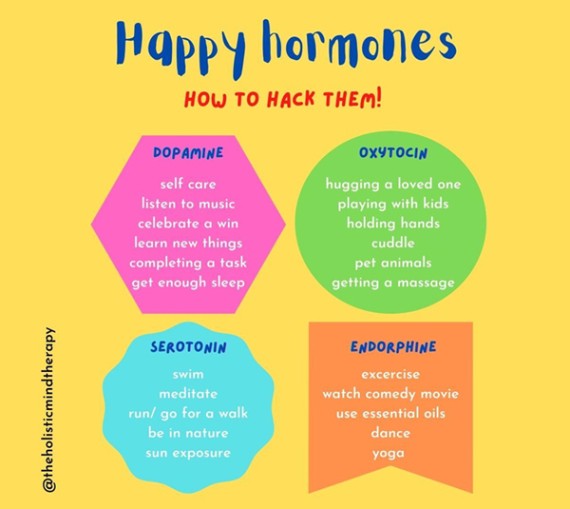What are hormones?
Hormones are chemicals produced by various glands in the human body whose primary function is to communicate as messengers and help in many bodily processes.
They are also known as neurotransmitters. The only difference between hormones and neurotransmitters is where they act. Hormones travel through the bloodstream, while neurotransmitters only occur in the brain and central nervous system.
Why are they important?
Did you know? Hormones work slowly, over time, and affect many different bodily processes, including:
-
Growth and development
-
Metabolism
-
Sexual function
-
Sleep- wake cycle
-
Reproduction
-
Mood
It is crucial for our mental health to understand these happy chemicals present in the brain and body because happy hormones mean a happy us! By understanding what these chemicals are and how they work, we can better understand how they affect our happiness and how to hack them.
D.O.S.E Happy Hormones :
There are four main chemicals that can drive our positive emotions that we feel throughout the day: dopamine, oxytocin, serotonin, and endorphins.
Dopamine :
(Pronounced: doh-puh-meen)
Also known as the reward hormone and considered the feel good hormone, it is released when we do something pleasurable. This could be eating a meal we like, listening to music, watching a movie, reading a book, getting a massage, or completing a physical exercise workout.
The release of dopamine gives feelings of well-being and motivates us to seek things we enjoy. It is largely responsible for instant gratification.
Oxytocin :
(Pronounced: ok-si-toh-suh n)
Also known as the love hormone or hugging drug, it is released when we come in contact with others and the levels generally increase with closenessnes and physical affection like hugging, kissing, cuddling, and sex.
Oxytocin boosts our immunity system and gives us the lasting feeling of calm and safety. It can help fight stress, improve our relationships, and promote long-lasting positive emotions, help promote trust, and empathy. It is also essential for childbirth, breastfeeding, and strong parent-child bonding.
Serotonin :
(Pronounced: ser-uh-toh-nin)
Also known as the mood stabilizer, is the original happy hormone, naturally triggered by regular things we can do each day like going for a walk, sleeping, and is essential for our wellbeing and happiness.
Fun Fact: 90% of your body’s serotonin is produced in the gut.
It helps regulate our mood as well as sleep, appetite, digestion, learning ability, and memory. It also helps decrease our worries and concerns.
Endorphins :
(Pronounced: en-dawr-fins)
Also known as the pain killer, endorphins are produced as a response to stress or discomfort but they’re also released during other activities, like eating, exercise, or sex. They help us push our bodies beyond their comfort levels and persist when we might otherwise want to give up.
Serotonin also plays an important role in many crucial systems in our body as it affects digestion, bone growth, and even organ development. It also helps create strong and positive emotions.
Article Written by - Priya Vijayran (MA Psychology, Reiki Master & Clinical Hypnotherapist)

